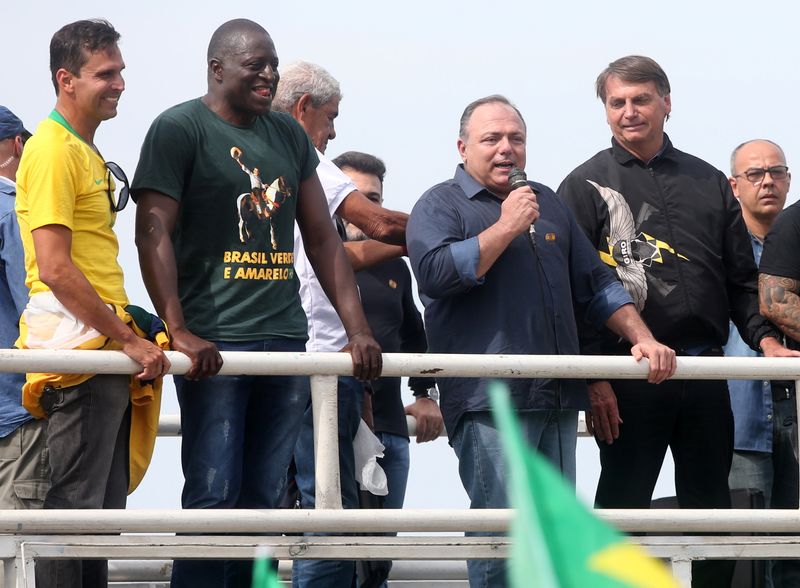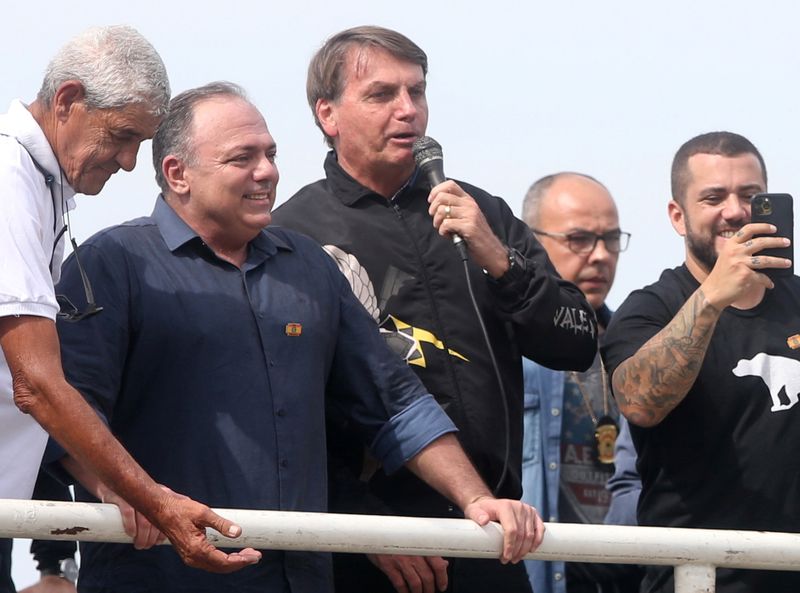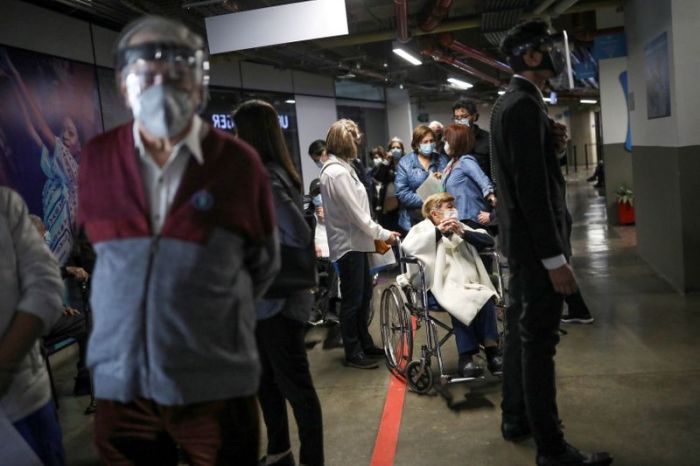BRASILIA (Reuters) -Pilloried for his failed stint as Brazil’s health minister and caught in the crosshairs of a Senate probe on the pandemic, General Eduardo Pazuello sought refuge last week before a friendly audience at a political rally in Rio de Janeiro.
With President Jair Bolsonaro’s arm draped over his shoulder, the active-duty general and former minister grabbed a microphone — and quickly turned his personal crisis into an institutional one.
By violating a ban on politicking by military officers, Pazuello has invited possible punishment from the armed forces or embarrassment for their commanders, say former generals and military scholars.
In Brazil, officers may take on civil government roles as a secondment, but they are forbidden from engaging in political activity or openly stating their party membership or political views.
In the 10 days since Pazuello drew cheers at that rally alongside the president, the army has remained silent.
On Tuesday, Bolsonaro named Pazuello “secretary of strategic studies,” a senior role in the presidential palace, months after replacing him as health minister during a deadly COVID-19 surge.
For military brass concerned that the armed forces are too entangled with an unpopular government and its shaky handling of the pandemic, Pazuello’s case is a canary in the coal mine. The president’s embrace of the brazenly political general suggests that for some officers allegiance to Bolsonaro is starting to trump military protocol.
“The vast majority of senior active-duty officers think this is undue interference by the president and it will undermine army discipline and hierarchy,” said retired General Paulo Chagas.
“Some soldiers share in a personality cult and think every word Bolsonaro utters is a divine order, but there are not many,” said Chagas, who campaigned on behalf of the president in 2018, in an interview at the army officer’s club in Brasilia.
Even Vice President Hamilton Mourao, a retired four-star general, has called for Pazuello to be disciplined and moved from active duty into the army reserves “to avoid anarchy taking over the armed forces.”
The Defense Ministry declined to comment, saying that Pazuello’s case was being handled internally by the army.
The army and the president’s office did not respond to requests for comment.
MINISTER, DEFENSE CHIEFS SACKED
The fresh tension between military officials and Bolsonaro, who quit the army as captain in 1988 to launch his political career, comes just two months after he unceremoniously sacked the defense minister and three chiefs of the armed forces.
At the time, people familiar with the matter told Reuters that Bolsonaro’s pressure on top military officials for public displays of their political support had soured relations and triggered the dramatic shakeup.
Bolsonaro has also stacked his government with current and former army officers, including nearly a third of his cabinet and thousands of other well-paid positions, further blurring the lines between the government and military.
It is a distinction the far-right president seems eager to erase. After campaigning on nostalgia for Brazil’s 1964-1985 military dictatorship, Bolsonaro has often referred to the armed forces as “my army” and suggested he could deploy them to defy state government lockdowns aimed at slowing the pandemic.
Brazil has lost more than 465,000 lives to COVID-19, with public health experts blaming Bolsonaro’s attacks on social distancing, disdain for mask wearing and early skepticism about vaccines for the highest death toll outside the United States.
After Bolsonaro fired two health ministers for refusing to endorse unproven COVID-19 treatments, he found a more compliant minister in Pazuello, who had no background in public health.
However, the general missed chances to guarantee an early supply of vaccines and was caught off-guard by a deadly second wave of infections this year. Deaths from the coronavirus rose from 15,000 to nearly 300,000 on Pazuello’s watch, and he has faced harsh questions from a Senate committee investigating how the government has handled the pandemic.
With the armed forces eager to separate themselves from that tarnished record, commanders should soon shift Pazuello into the reserves, said Paulo Kramer, a University of Brasilia politics professor who regularly meets with senior army officers.
Ever since a 21-year military dictatorship ended in 1985, the armed forces have been careful to stay out of politics and set rules that no soldier could be involved, Kramer said.
However, it will be harder to extricate the legion of other officers in government, who are growing accustomed to the pay and other perks of civil service.
Having crossed so many lines already, Brazil’s generals are finding it difficult to get the genie back in the bottle.
“We all think the armed forces should not get mixed up with politics,” said General Roberto Paternelli, who was elected to Congress in 2018 after retiring from the army helicopter corps and joining Bolsonaro’s party.
“When politics enters the barracks through one gate, discipline leaves through the other,” said General Chagas.
(Reporting by Anthony Boadle;Editing by Brad Haynes and Aurora Ellis)

























